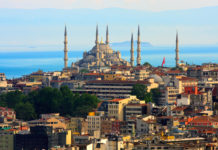Following the Shahbag protests which took place in February in Bangladesh’s capital Dhaka, 60 people have died and the country is witnessing the worst political turmoil since its inception. After the International Crimes Tribunal found two leaders of the country’s largest Islamist party Jamaat-e-Islami guilty of war crimes during the Liberation War of 1971, a nation has been split in half.
Secular nationalists have demanded capital punishment for those found guilty of war crimes and Islamists have accused pro-government bloggers of blasphemy against the Prophet Muhammad (saw). The most recent rally led by Hefazat-e-Islami failed to pressure Prime Minister Sheikh Hasina to introduce a new anti-blasphemy law which has resulted in hundreds of deaths and over 3,000 injured. In an exclusive interview with Dilly Hussain, Media Representative of Jamaat-e-Islami UK, Nazrul Islam, tells us his views on events that are unfolding in Bangladesh.
DH: Could you briefly explain why the Shahbag protests begun and if it had any influence on the verdict of capital punishment of Delwar Hossain Sayeedi (a senior Jamaat leader)?
NI: The so-called Shahbag movement was a drama staged by the government. The intelligence agencies were providing funds and logistical support to keep the protests at Shahbag alive. There is no way the government can absolve itself from the charge of trying to use these protests for political mileage. This was not a mass movement, it was all set up.
Only government supporters who are members of the Awami League led 14 Party Alliance attended this staged mass protest. The perpetrators of this drama demanded death sentences for those who were accused of war crimes and facing trial. Everyone in the country is well aware that the International Crimes Tribunal which is international only by name and has no international standards is in nature a kangaroo court established to silence political opposition. All but two who are facing the war crime charges are leaders of Bangladesh JI.
The government used this movement to carry out their agenda which was ensuring capital punishment for the accused. They began their protest because one of the accused, Abdul Qader Mollah, was not given the death sentence. As a result of the protest, the government rushed through legislation to overturn the sentence to a death penalty. Shahbag played a vital role in ensuring that Mawlana Delwar Hossain Sayeedi gets capital punishment despite the prosecution failing to prove any charges against him. It was alleged that Shahbagh was used to put pressure on the judges so that they would give a verdict according to the government’s will.
DH: The Shahbag activists have demanded capital punishment for all of JI’s leadership who have been found guilty of war crimes, a ban of JI from Bangladeshi politics and a boycott of all institutions associated with your organisation. What are the reasons for these harsh demands?
Subscribe to our newsletter and stay updated on the latest news and updates from around the Muslim world!
NI: The convener of the Shahbag farce is a member of the ruling party Awami League. The whole movement was controlled by the Awami League’s student wing Bangladesh Chattra League. In a recent survey conducted by one of the most prestigious daily newspapers of Bangladesh “Prothom Alo” revealed that only a handful of people supported this movement. The overwhelming majority of the country was unaware of its existence. The political vendetta is the only reason behind those illegal demands.
DH: Are some members of JI’s leadership guilty of war crimes during the Liberation War of 1971?
NI: Senior leaders of JI are currently in prison and are accused of assisting the Pakistani army’s war crimes. JI rejects these allegations. It objected to the break up of Pakistan because it felt an all powerful Indian neighbour would equally dominate Bangladesh. They did support the union of Pakistan, but so did other parties on the right of the political spectrum. JI leaders currently accused did not face any charges after independence. The party was banned, like other political parties when the country became a one party state. It became legal again in 1982. JI is a fully fledged political party of Bangladesh’s constitutional democracy.
DH: What are your views on the trials that took place in the International Crimes Tribunal during 2010-2011?
NI: The ICT of Bangladesh lacks any international standard. It is a partisan court established to suppress the voice of the opposition. Leaders of opposition parties JI and Bangladesh Nationalist Party (BNP) have been arrested under false charges. The government has failed to produce any credible evidence against the accused JI leaders that they were involved in any sort of criminal activities or violated human rights during the nation’s Liberation War in 1971.
A law drafted in 1973 is the basis of this tribunal which was condemned by many international organisations, including International Bar Association, European Union, United Nations, US State Department, Amnesty International, Human Rights Watch and many others. The IBA has proposed 17 amendments to the law that was ignored by the Bangladeshi government. Stephen J Rapp, Ambassador of President Barack Obama to the War Crime Tribunal suggested that laws of the ICT are flawed and must be brought to the internationally agreed standard. That is why we demand that this tribunal must go as it has no credibility to judge the accused because of its partisan nature.
DH: The student wing of JI “Islami Chattra Shibir” has been accused of unprecedented violence, acts of terrorism and torture against members of the public and supporters of opposition parties, how true are these accusations?
NI: These accusations are totally false and a product of yellow journalism, unfortunately this has become a standard in Bangladesh because majority of the media is set up by government supporters. This also establishes the fact that only government supporters are given licenses to establish media outlets. The government recently forcefully closed Diganta Television and Islamic TV in Bangladesh because they were broadcasting opposition views. The editor of daily newspaper “Amar Desh” was arrested and the publication closed down simply because it criticised the government. In reality, Shibir is a victim of not only state sponsored terrorism but also being attacked by Bangladesh Chattra League on a daily basis.
DH: Would it be fair to say, that JI is equally involved in the corrupt politics that has dominated Bangladesh since its creation?
NI: It will be totally unfair to group JI with other political parties of the country. JI is well revered in Bangladesh as a political party of honest men. If you visit Bangladesh, many people will vouch for JI and reaffirm that they are the sincere people of society. In the last government of the Four Party Alliance, JI had two ministers and they had been praised for their honesty and efficiency even by stern critics.
DH: Being the oldest and largest Islamist Party in Bangladesh, how would you explain the political alliance your organisation has formed with the BNP, a secular nationalist party led by a woman, Khaleda Zia?
NI: BNP is a nationalistic party, which draws its idea from Bangladesh’s deeply-rooted Islamic identity. We formed a strategic alliance as both parties believe in an independent Bangladesh.
DH: The founder of JI, Abu Ala Maududi envisaged the end goal of the organisation being an Islamic state governed by Shariah, a Caliphate. Have the aims of JI changed or does it remain the same?
NI: JI is working to establish a just and peaceful society based on Islamic principles. We believe in a society where people of all creeds and faiths will live together and no one will violate the freedom of others. This was our goal and objective all along and we have not changed.
DH: What was the motive of the bloggers who blasphemed against the Prophet Muhammad (saw) and do you feel the government has dealt with this matter sufficiently?
NI: We believe that everyone has their right of opinion. That does not mean that in the name of freedom of expression one will offend other people’s beliefs. That is what the bloggers did. Taking advantage of new digital media a group of misguided, anti-Islamic youth used popular blog platforms to spread vile against Islam and promoting religious hatred. The majority of the bloggers who were leading the Shahbag are involved with anti-Islamic literature and actively spreading lies, concocted stories and vulgarity against Islam and its various institutions on the internet.
Loyalist Awami Leaguers and spoiled leftists such as Dr. Imran H Sarker, Omi Rahman Piyal, Arif Jebtik, Ibrahim Khalil, Asif Mahiuddin are a few to be named among many, who are actively campaigning against Islam. These gangs of blasphemers for a long time have been attacking Allah (swt), the Qur’an, Prophet Muhammad (saw), the hijab as well as beliefs of other religions. It will be difficult for Muslims with even a basic regard for their beliefs not to be enraged. The government of Bangladesh is fanning this hysteria of mass defamation of Islam in the name of trying the accused war criminals. The government allowed the above-mentioned activities to go unchallenged and even made one of the perpetrators a national hero.
DH: Two nationwide protests led by a coalition of Bangladesh’s Islamist groups have taken place to introduce a new anti-blasphemy law that demands capital punishment if anyone is found guilty of blasphemy against the Prophet Muhammad (saw) and Allah (swt). Does JI support this call which has so far failed to convince PM Sheikh Hasina?
NI: A person may hold any views and has the right to preach it but not in the expense of jeering at other people who have different views and ideas. Muslims love the Prophet Muhammad (saw) more than their own lives. Blasphemy laws are in place even in a modern secular country like England, simply because majority of the people here belong to a Protestant branch of Christianity. If this is possible here, why not in Bangladesh?
DH: The most recent rally led by Hefazat-e-Islami has been referred to as the “Motijheel Massacre” which resulted in hundreds of deaths and thousands injured. Isn’t this a sign suggesting that the Awami-led government will not compromise on the matter of a new anti-blasphemy law and further Islamisation of Bangladesh?
NI: More than a 100,000 Hefazat-e-Islami volunteers took part in a peaceful sit-in protest in the Motijheel area of Dhaka against the government. The Asian Human Rights Commission described how the joint forces of Police, Rapid Action Battalion (RAB) and Border Guard of Bangladesh (BGB) tried to evacuate them from the site. When this became impossible, they cut the electricity during the night and killed more than 2,000 innocent people, some while they slept, others as they woke for fajr prayers. At present it seems that the Awami-led government will not yield under popular demand. But the people of Bangladesh have spoken. We will see where the event draws us.
DH: Would you describe events that have taken place in Bangladesh since February an Islamic uprising like that of the Middle East?
NI: I will certainly categorize it with the Arab Spring and the popular uprising of the Arab people in the Middle East. Bangladesh is a predominantly Muslim country. No fact can alter that.
You can follow Dilly Hussain on Twitter @DillyHussain88












![24 Hour Road Trip Through Free Syria [Short Film]](https://5pillarsuk.com/wp-content/uploads/2025/02/IMG_5907-218x150.jpg)









